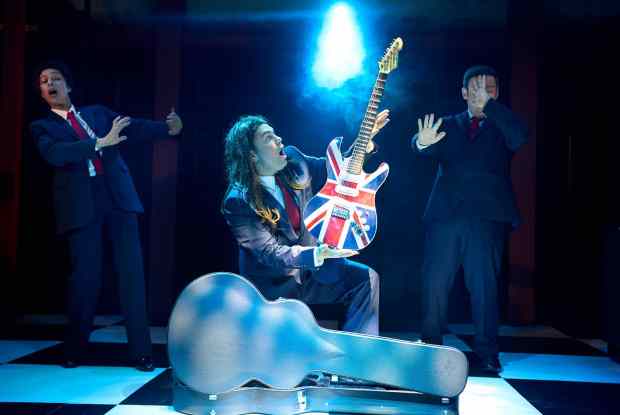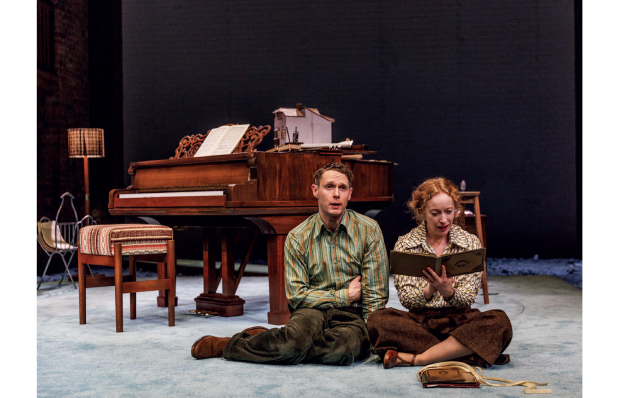Some of the marketing efforts by amateur impresarios up in Edinburgh are extraordinary. I was handed a leaflet for a poetry show called Don’t Bother. I didn’t. Tony Slattery appears in Slattery Will Get You Nowhere (a good pun that advertises the content), in which the ageing comic takes the audience back to the 1990s. In those days he was a handsome, clever, charismatic wag who suffered from an excess of self-regard. Now he’s a grizzled, ramshackle presence, jowly and ill-shaven, like a forgetful pensioner on his way to the day centre.
He starts his show with a lot of banter about wine but he doesn’t drink on stage. Alongside him sits a friendly interviewer who guides him through the rougher bridleways of his anecdotes. His memory is a little shaky but his comic instincts and his unquenchable love of mischief haven’t deserted him. He hints at an episode of sexual abuse at school but refuses to go into details ‘because it’s not funny, and I shouldn’t say this either because it really isn’t funny, except that it is: child abuse can come back to bite you on the arse.’ He once hosted an event sponsored by a leading champagne marque. ‘Remarkable bubbly, isn’t it?’ he told the crowd. ‘How they got the cats to squat on the bottles I can’t imagine.’ He recalls being sent on stage at the Baftas to improvise while a lighting cue was being rearranged. ‘I’m here as a last-minute replacement for the Evening Standard’s theatre critic Nicholas de Jongh who — it has just been announced — is a complete cunt.’ Slattery pauses. ‘That was the last time the Baftas were televised live.’ These glimpses of a crumpled but indomitably funny comedian should be recorded and uploaded to YouTube. He’s still a miraculously gifted performer and his repertoire of gags and anecdotes, salvaged from a reluctant memory, have the feel of a cult classic.
IvankaPlay is a monologue about Ivanka Trump’s wacky relationship with her dad. She’s amazed when he wins the presidency in 2016 because she assumed that the campaign was just a stunt to win cheap advertising for the family brand. A friend tells her she must use her position ‘to do good in the world’. Ivanka investigates climate change and urges ‘Daddy’ to act against ‘fire-air’ and ‘reef-death’. But he changes the subject and suggests that she take over Trump National Golf Club in Los Angeles. She drops climate change instantly and starts thinking about redesigning the club’s restaurant menu.
For satirical purposes the writer Charles Gershman has reduced Ivanka’s IQ by a large margin and turned her into a ditzy hedonist rather than a cool, savvy presidential adviser. This version of Ivanka is a ravishing voluptuary debauched by the sight of her reflection in the mirror. ‘My hotness magnifies Daddy’s aura,’ she pants.
Accidentally Muslim is a riveting hour of stand-up by Lauren Booth who was doing a journalism course when Tony Blair became prime minister in 1997. ‘In the time it takes to say Blair’s sister-in-law there were lots of jobs.’ She was sent to cover a story in Palestine and she initially felt repelled by ‘the fasting penguins’, as she called Muslim women. But she stayed and converted to Islam which she describes as ‘a light in my heart’.
The Passion of the Playboy Riots is a backstage comedy about W.B. Yeats and Lady Gregory who co-founded the Abbey Theatre in Dublin. They sit in the wings discussing Irish nationalism while keeping an eye on their latest controversial production. This subtle historical play touches on lesser-known aspects of the Irish cause. The predominantly Catholic nationalists felt ashamed that their movement had been embraced by so many Protestant activists such as Wolfe Tone, Charles Stewart Parnell and Yeats himself. And even members of Yeats’s own circle were jealous of his fame among the English. ‘If we want your opinion, Mr Yeats, we’ll ask a London cab driver.’ This is a small gem of a play which deserves to be expanded and taken on by a producing theatre.
The Red by Marcus Brigstocke is a meditation on alcoholism. Ben is 43 and has been sober since he went into rehab aged 18. When his bibulous father dies he leaves a letter instructing Ben to enjoy a single glass of Château Lafite, 1979. ‘One drink can’t hurt.’ Dad shows up as a ghost in the family wine vault where he and Ben discuss their differing attitudes to booze. Dad’s admiration and love for Ben are so powerful that he seems the last person to try to knock him off the wagon. Is the ghost really a personification of Ben’s alcohol problem? This is a beautifully acted and heartfelt show and it just about warrants its hour-long running time. But one minute more would have been too much.
Got something to add? Join the discussion and comment below.
Get 10 issues for just $10
Subscribe to The Spectator Australia today for the next 10 magazine issues, plus full online access, for just $10.
You might disagree with half of it, but you’ll enjoy reading all of it. Try your first month for free, then just $2 a week for the remainder of your first year.














Comments
Don't miss out
Join the conversation with other Spectator Australia readers. Subscribe to leave a comment.
SUBSCRIBEAlready a subscriber? Log in